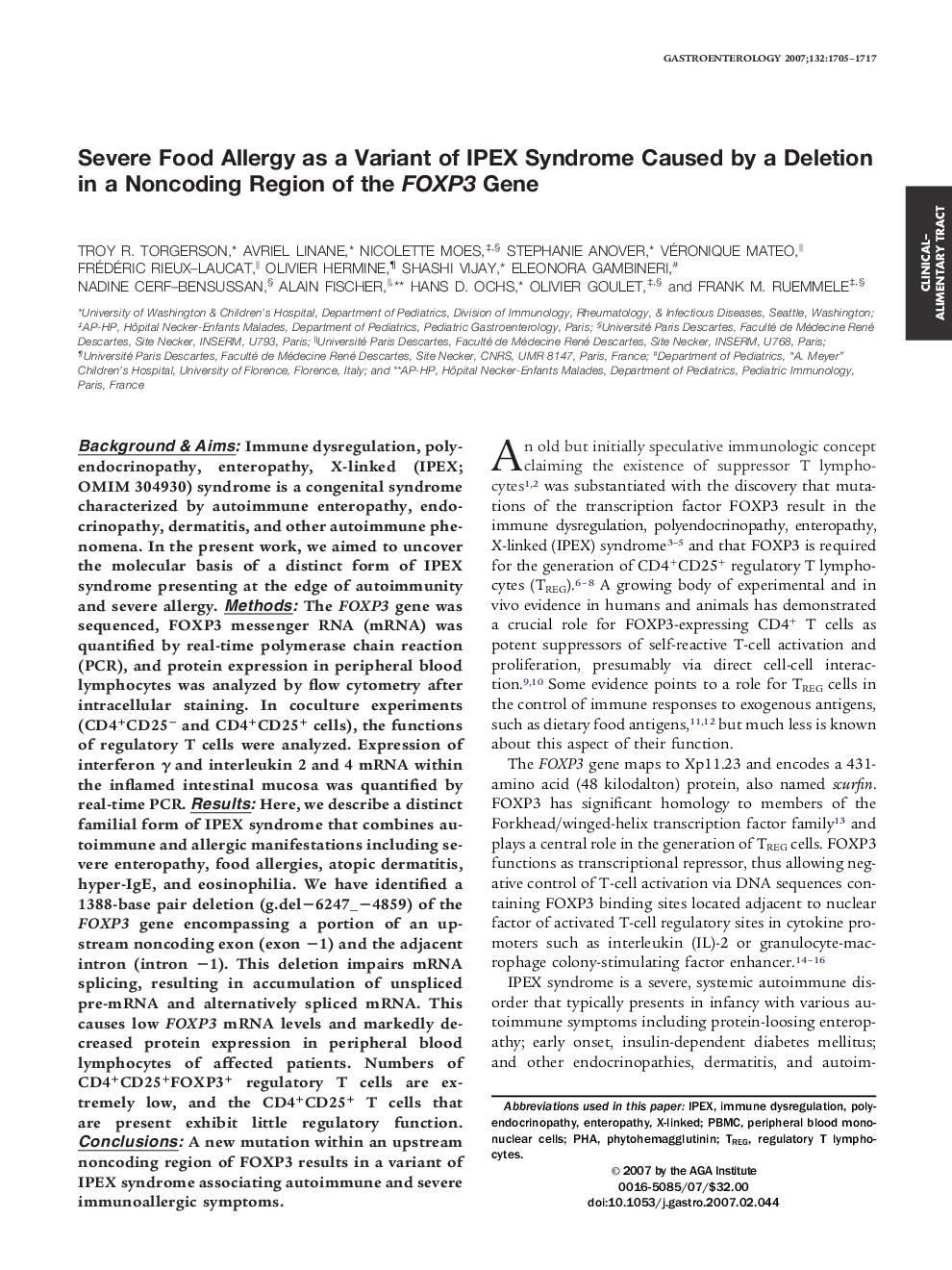| کد مقاله | کد نشریه | سال انتشار | مقاله انگلیسی | نسخه تمام متن |
|---|---|---|---|---|
| 6097068 | 1209900 | 2007 | 13 صفحه PDF | دانلود رایگان |
عنوان انگلیسی مقاله ISI
Severe Food Allergy as a Variant of IPEX Syndrome Caused by a Deletion in a Noncoding Region of the FOXP3 Gene
دانلود مقاله + سفارش ترجمه
دانلود مقاله ISI انگلیسی
رایگان برای ایرانیان
کلمات کلیدی
موضوعات مرتبط
علوم پزشکی و سلامت
پزشکی و دندانپزشکی
بیماریهای گوارشی
پیش نمایش صفحه اول مقاله

چکیده انگلیسی
Background & Aims: Immune dysregulation, polyendocrinopathy, enteropathy, X-linked (IPEX; OMIM 304930) syndrome is a congenital syndrome characterized by autoimmune enteropathy, endocrinopathy, dermatitis, and other autoimmune phenomena. In the present work, we aimed to uncover the molecular basis of a distinct form of IPEX syndrome presenting at the edge of autoimmunity and severe allergy. Methods: The FOXP3 gene was sequenced, FOXP3 messenger RNA (mRNA) was quantified by real-time polymerase chain reaction (PCR), and protein expression in peripheral blood lymphocytes was analyzed by flow cytometry after intracellular staining. In coculture experiments (CD4+CD25â and CD4+CD25+ cells), the functions of regulatory T cells were analyzed. Expression of interferon γ and interleukin 2 and 4 mRNA within the inflamed intestinal mucosa was quantified by real-time PCR. Results: Here, we describe a distinct familial form of IPEX syndrome that combines autoimmune and allergic manifestations including severe enteropathy, food allergies, atopic dermatitis, hyper-IgE, and eosinophilia. We have identified a 1388-base pair deletion (g.delâ6247_â4859) of the FOXP3 gene encompassing a portion of an upstream noncoding exon (exon â1) and the adjacent intron (intron â1). This deletion impairs mRNA splicing, resulting in accumulation of unspliced pre-mRNA and alternatively spliced mRNA. This causes low FOXP3 mRNA levels and markedly decreased protein expression in peripheral blood lymphocytes of affected patients. Numbers of CD4+CD25+FOXP3+ regulatory T cells are extremely low, and the CD4+CD25+ T cells that are present exhibit little regulatory function. Conclusions: A new mutation within an upstream noncoding region of FOXP3 results in a variant of IPEX syndrome associating autoimmune and severe immunoallergic symptoms.
ناشر
Database: Elsevier - ScienceDirect (ساینس دایرکت)
Journal: Gastroenterology - Volume 132, Issue 5, May 2007, Pages 1705-1717
Journal: Gastroenterology - Volume 132, Issue 5, May 2007, Pages 1705-1717
نویسندگان
Troy R. Torgerson, Avriel Linane, Nicolette Moes, Stephanie Anover, Véronique Mateo, Frédéric Rieux-Laucat, Olivier Hermine, Shashi Vijay, Eleonora Gambineri, Nadine Cerf-Bensussan, Alain Fischer, Hans D. Ochs, Olivier Goulet, Frank M. Ruemmele,